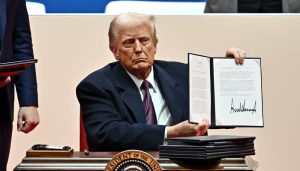
On January 21, 2025, President Donald Trump signed an executive order initiating the United States’ withdrawal from the World Health Organization (WHO). This decision, marking the second such attempt during his presidency, has sparked significant debate among global health experts and policymakers.
Rationale Behind the Withdrawal
President Trump’s executive order cites several reasons for the withdrawal:
- Mishandling of the COVID-19 Pandemic: The administration alleges that the WHO failed to adequately address the COVID-19 outbreak, which originated in Wuhan, China.
- Lack of Independence: The order points to the WHO’s perceived inability to operate independently of political influences from member states, particularly China.
- Financial Disparities: Concerns are raised over the “unfairly onerous payments” the U.S. contributes to the WHO compared to other nations.
Financial Implications
The United States has historically been the largest financial contributor to the WHO, accounting for approximately 18% of its total funding. In the 2024-2025 budget cycle, the U.S. contributed nearly $1.2 billion to the organization’s $6.8 billion budget. The cessation of U.S. funding could significantly impact the WHO’s ability to operate and support global health initiatives.
Global Health Impact
Experts warn that the U.S. withdrawal could have far-reaching consequences:
- Disease Control Programs: The WHO’s efforts in combating diseases such as HIV/AIDS, tuberculosis, and malaria may face funding shortages, potentially reversing progress made over decades.
- Pandemic Response: The absence of U.S. support could weaken global preparedness and response mechanisms for future health emergencies.
Shift in Global Influence
The U.S. exit from the WHO may create a leadership void that other nations could fill. Notably, China might increase its influence within the organization, shaping global health policies and priorities. Lawrence Gostin, a global health law professor at Georgetown University, described the withdrawal as “a grievous wound to world health, but a still deeper wound to the U.S.”
Historical Context
This move mirrors President Trump’s 2020 attempt to withdraw from the WHO, citing similar concerns. That process was halted by President Joe Biden upon taking office in 2021. The renewed withdrawal effort underscores ongoing debates about the U.S.’s role in international health organizations.
Conclusion
The decision to withdraw the United States from the World Health Organization carries significant implications for global health initiatives and U.S. leadership on the world stage. As the process unfolds over the next 12 months, the international community will closely monitor the impacts on health programs and geopolitical dynamics.

